Shahida is a volunteer and is paid by IOM through the Cash for Food program. She is featured here in a segment about the recent talks between Myanmas officials and Rohingya refugee leaders produced by Al Jazzera.
"I want to send messages to my people and to the world through my poems."
-Shahdia
Refugee/humanitarian, Shahida
In recent posts it has been my honor to present, with comment, poems written by several young Rohingya men, all refugees who have found temporary contract work within the humanitarian sector in Bangladesh.
Long overdue, I now introduce a woman, Shahida. She describes her command of English "not very good", but I have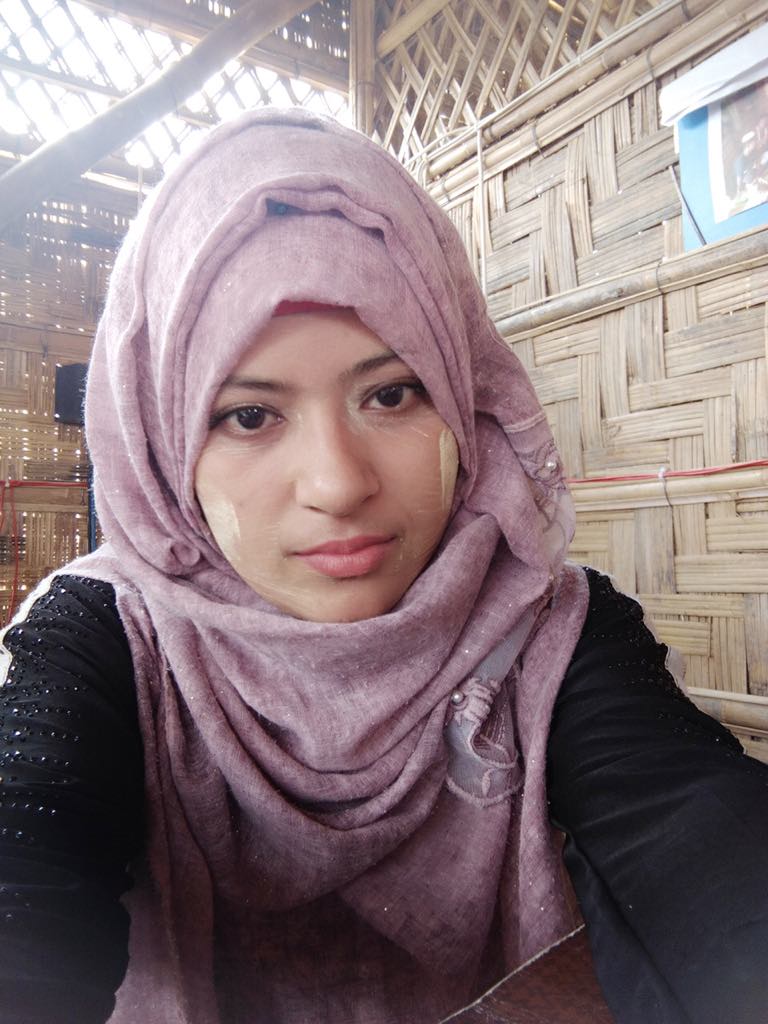 been able to learn a great deal about her through our text conversations and by reading her poems.
been able to learn a great deal about her through our text conversations and by reading her poems.
Below I present some of her writing and report what I have learned from her.
Here is how she introduced herself to me.
"My name is Shahida. I was born in Irrawaday Division from Rohingya parents. I am 23years old. In 2000, my family was deported to Rakhine state where most of the Rohingya live. In 2012, I graduated from high school but I couldn't continue my studies and I have to work to support my family. I worked as interpreter at MSF until 2017. In 2017, we had to flee to Bangladesh. I am now living in Bangladesh, in a refugee camp."
Some context
The situation of the Rohingya is complex and has a long history. The UN and many human rights watch groups has described the Rohingya as one of the most persecuted ethnic groups in the world. Their plight has no end in sight as the government of Myanmar seems unable or unwilling to respond to international pressures for meaningful, positive actions that would repatriate the many hundreds of thousands of Rohingya IDPs and refugees. Never intended to be permanent homes, the refugee camps in places like Cox's Bazar in Bangladesh have become long term settlements that some have called open-air prisons.
Life as a refugee can be hard, but as a female Shahdia has grown up in a culture where gender differentiation may be better characterized as gender stratification. As she describes in her poems, the opportunities afforded women and girls are less than those of the males in the culture. Her life is doubly challenging as both a refugee and a female. That said, she is a remarkably capable and forward looking young woman, and defies some of the barriers she faces.
Her poems
Translated into English, these poems are necessarily stripped of some of their beauty and subtlety. With that in mind, below are her poems, each with a short explanation.
Shahdia writes,
"My first poem is about daughter. In our society, girls are discriminated, they have to face domestic violence, they need dowry to get married, they don't have equal chances to learn education. Working at a NGO, I found women and girls discriminated against and ill treated. They always share their feelings with me. So I wrote my first poem."
Being proud of your great daughter
In this world,
Giving birth to a baby daughter should bring more pride
than having the gift of treasures
Because she is more precious than them.
A mother who gave birth to baby daughter
should not be treated as like as she has committed a crime.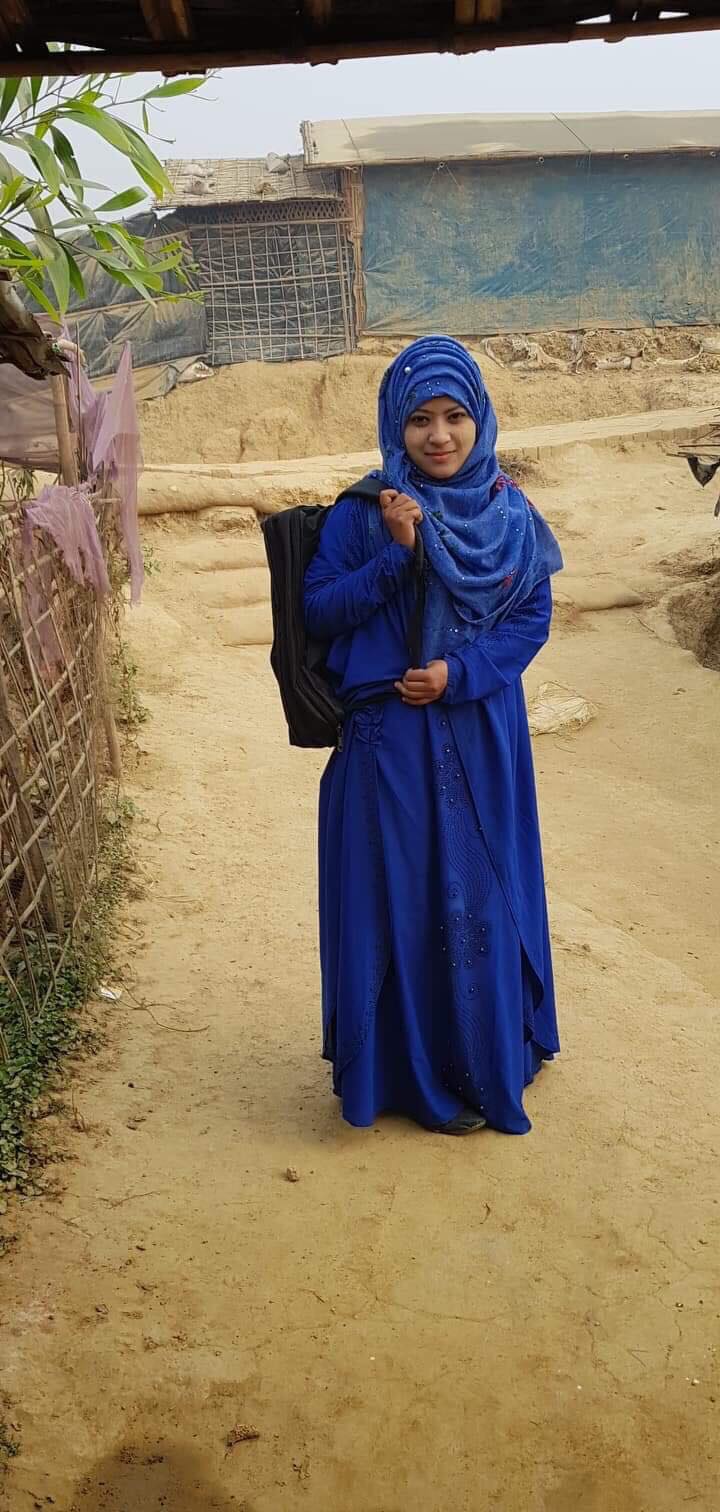
And daughters should not be thought as burdens.
They should be regarded as the blessing of God.
"Some people in our society (I don't mean all), if a woman gave birth to a female child, her father-in-law, mother-in-law and relatives including her husband treat her badly. She is thrashed by her husband and constantly harassed for it."
Not a burden but a blessing
Female child is seen as burden
because they have to give dowries for them,
and also girls can't work.
But in the view of Islam, having a daughter is the blessings of God.
At the age of attending school in childhood,
Please send her to school regularly
Education that is very important.
Please don't restrict her and don't criticize it.
Please don't say girl needs not education.
Please let her learn and be educated.
"Some of our religious elders have the view that girls do not need education though Islam teaches us that every one must be taught education, it is one of the responsibilities of parents for their children. But in our society, they always try to restrict the girls from going to school, criticize them, and discourage them."
In marriage there should be fairness
When she is grown up,
please don't arrange her marriage without her consent.
And please don't force her.
And please let her choose her life partner,
her husband and allow her to reveal her desire
and her own will and let her choose herself.
After her marriage, please don't treat her like a guest or stranger
at her own home where she was born and grew up
because it hurts her feelings too much
This house is the place where she happily lived and played with parents at her childhood.
The groom who asks for her hand with bridal gifts is the one who follows the religion heartedly.
But, please don't trade or sell the life of manhood as like as slaves
and don't degrade yourself.
Like dark ages, please don't treat your wife like a slave
and stop the domestic violence.
She is also a human being like you.
Be kind to her.
And respect her love.
To build a happy and peaceful world, let us not segregate between male and female
and let us not discriminate between son and daughter.
Let's treat them equally with love.
She says,
"I want to send messages to my people and to the world through my poems. My poems are the real voice of Rohingya women that need to be heard. They too deserve equality."
A humanitarian worker
Like many refugees, Shahida has found temporary work within the humanitarian sector. She is currently working as a volunteer for the Site Maintenance Engineering Project (SMEP), a joint earthworks and site preparation project of the 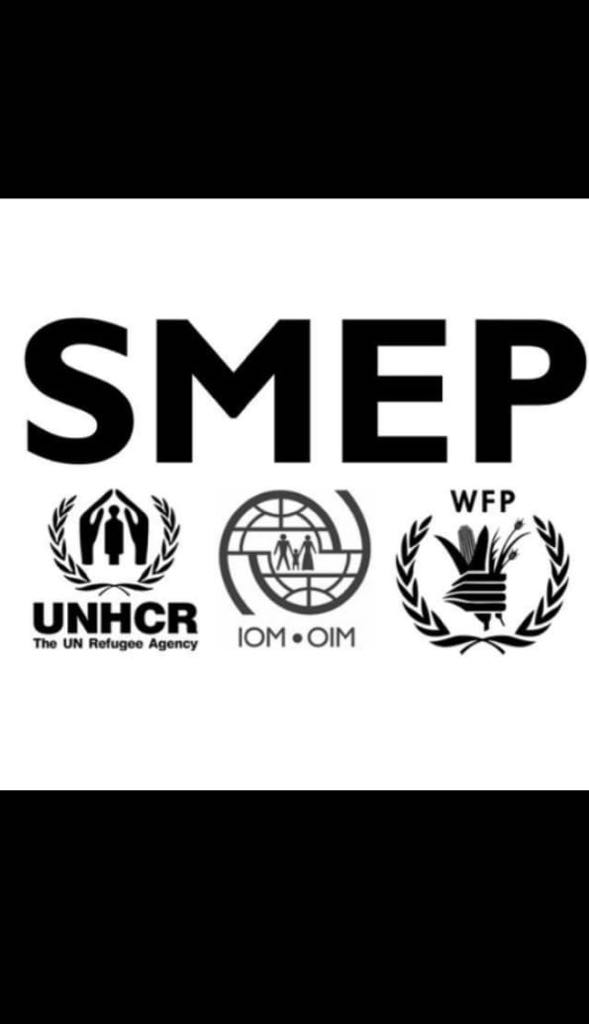 UNHRC, IOM, and WFP. She is tasked with helping to supervise the workers and submitting the daily reports; she is paid by IOM through the Cash for Work (CFW) program.
UNHRC, IOM, and WFP. She is tasked with helping to supervise the workers and submitting the daily reports; she is paid by IOM through the Cash for Work (CFW) program.
When she is not working, she and some of her friends tend
a garden in the refugee camp. In the evenings she and her friends spend their time cooking, and on recreational activities.
She says,
"We listen to the music and sometimes sing songs and watch movies on smartphones. But, when we were in Burma, women and girls would gather in the moonlight. We would recite Rohingya traditional classical poetry called Holla in Rohingya. But here we can't gather like that anymore."
Indeed, in many ways life is very different in the refugee camps than it was back in Burma. Shahida describes,
"In Rohingya marriage, we sing songs, dance, recite poems and Holla. Here we cannot afford big gatherings and 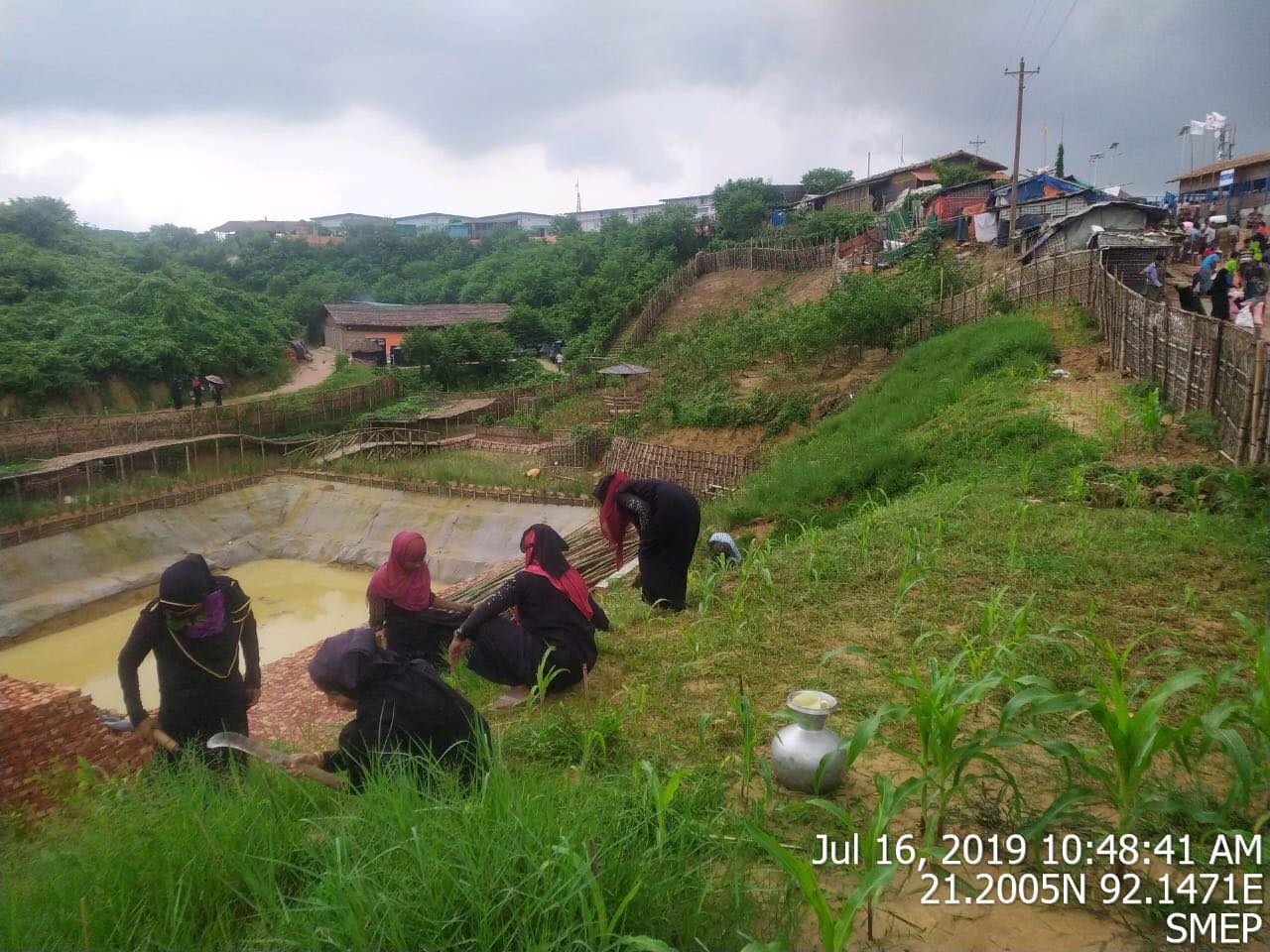 celebration. Births and funerals are the same like back in Burma. But, with funerals, all relatives can't participate like Burma because we are living in different camps. Travel between camps is restricted.
celebration. Births and funerals are the same like back in Burma. But, with funerals, all relatives can't participate like Burma because we are living in different camps. Travel between camps is restricted.
If we need to have medical treatment, we must get permission of camp in charge. He will give a recommendation letter and we have to show it to the authorities. Birth control and other medications are available in the MSF maternity clinics.
There are many hospitals and dispensaries around the camps but people don't get proper treatment, so who can afford have to go to private hospital but those can't afford remain untreated."
I asked her why there seemed to be more men writing poetry than women and she pointed out that,
"In my community, the rate of illiteracy among women is much more higher than men. So there are more male writers than females".
She went on to say,
"In the camps, most of the men are jobless and they are uneducated as well. So they marry two or three wives and no one controls them. Most women are facing domestic violence, and there are many divorce cases and health issues in camps. Rohingya children have no future here. There is no formal education system for them. They could be easy preys of traffickers and other self interest groups. I am really worried about their future. They have no hopes."
This prompted me to ask the #MeToo #AidToo question about sexual exploitation or harassment from the nationals or internationals in the organizations she has worked for. I was heartened when she said,
"No, there is no sexual harassment by DRC towards women. I have worked at DRC for one and half year. I didn't find such things. Their international staff are really good."
Ending our latest conversation she asked,
"Why did the world fail to protect Rohingya people and bring them justice? What should Rohingya do to get justice? What would be the women's role?"
All good questions, those, and to which I have no easy answers. I do know that human rights are demonstratively and inexorably women's rights, and that to be a humanitarian is also to be a feminist.
My thoughts on Shahida
I opened this post by saying that it was my honor to present the words and thoughts of these Rohingya refugee/humanitarians. I am touched by Shahida's words and sensed very clearly an urgency in our conversations, a deep desire to be heard.
In the short term I will continue to listen to these voices and share as per the requests made by these women and men. In the meantime, if you have any feedback or questions, you can contact me via email here.

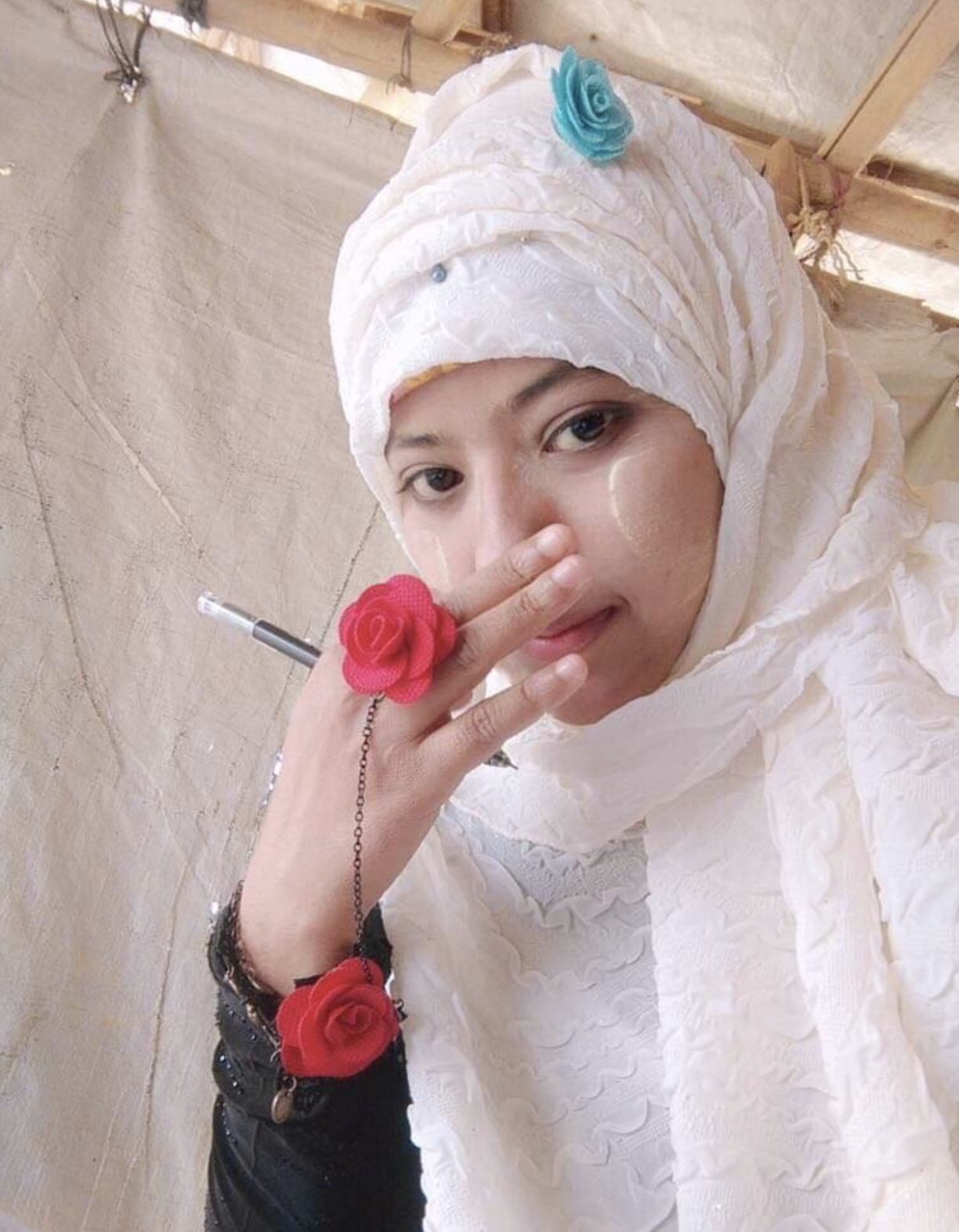
 Follow
Follow
No comments:
Post a Comment
Your comment will be approved soon and your email will not be published.. thanks..